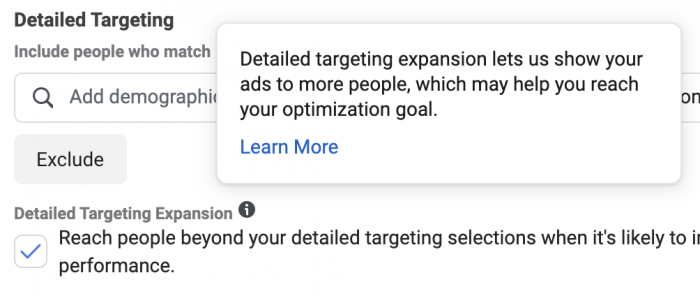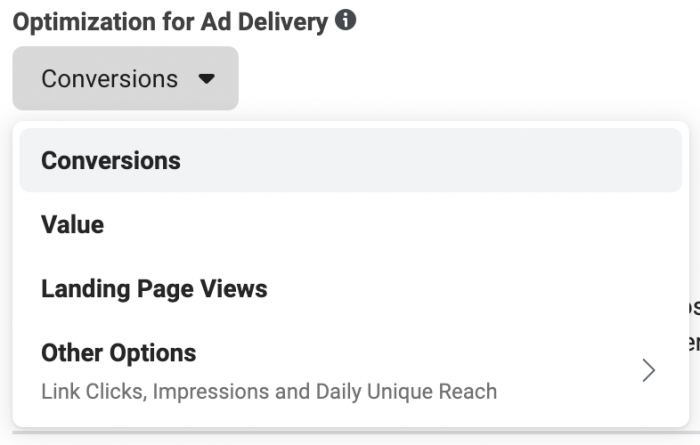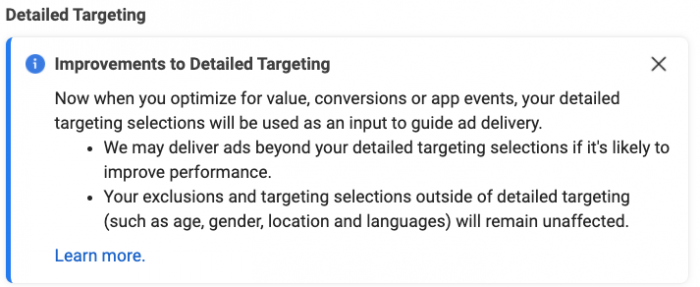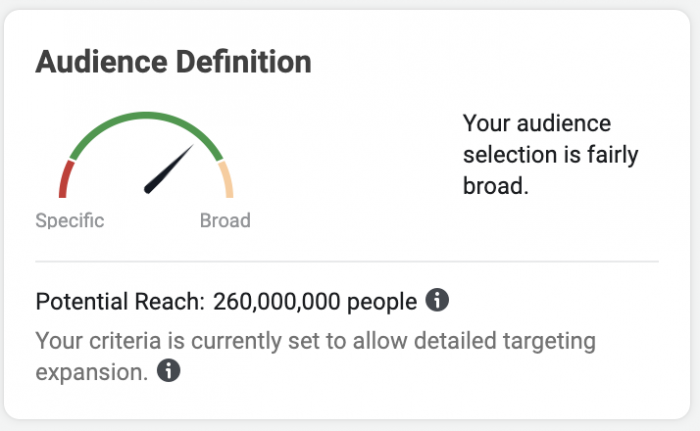Facebook is making a change to force advertisers to potentially target more broadly using Targeting Expansion for some situations. It’s a big change that could lead to more results (if it works the way it’s designed), but it may also upset advertisers wanting to limit targeting to a smaller group.
Note that this change is still rolling out (I don’t have it yet, but we’ve confirmed it happening for some).
Let’s dig in to explain what Targeting Expansion is and how this will impact your advertising.
What is Targeting Expansion?
After entering your target audience in an ad set, you may have seen a check a box to turn on Targeting Expansion.

When turned on, Facebook will test and monitor to determine if more or cheaper conversions can be found outside of your designated audience. If so, Facebook will dynamically expand to reach these other people. Facebook uses the demographics, interests, and behaviors you select as a guide.
Note that age, gender, location, and language settings you make will continue to apply. Additionally, Facebook will respect any exclusions you added to your targeting when expanding your audience.
Targeting Expansion is available for all objectives, other than Reach and Brand Awareness. It also cannot be used when promoting a Special Ad Category.
The Change
Okay, now let’s get to the big change.
Announced in Marketing API v12.0, Targeting Expansion will be turned on automatically when optimizing for conversions, value, or app events while using the Conversions objective.

When Targeting Expansion is turned on automatically in these cases, advertisers will not be able to turn it off. It will look like this (thanks to Luke Elliott for the image)…

Note that when optimizing for actions other than conversions, value, or app events, targeting expansion will be turned off by default — but can be turned on (other than the situations described earlier).
The Problem with Targeting Expansion
I’ll admit that I really wasn’t happy when this was first announced. I enjoy targeting a small, warm audience when trying to get conversions. It’s part of my process. But, this update has forced me to take a closer look at how Targeting Expansion works and whether it may work for me.
One of the surface-level problems with Targeting Expansion is that when you turn it on, the “Potential Audience” immediately balloons to the size it would be if you removed all targeting restrictions within a location.

Truthfully, this is what upset me. It may have been my own basic misunderstanding of how this works — or is supposed to work.
If Targeting Expansion works as it should, it isn’t always applied. It may be rarely or never applied. It’s just that Facebook COULD expand your audience as much as the delivery system wants (within constraints mentioned earlier) if it may lead to more conversions.
This, of course, is where it gets dicey. There’s a lot of “in theory” that does some heavy lifting when talking about Targeting Expansion. “In theory,” you could end up with more conversions if Facebook expands your audience. But, there’s a whole lot of “we don’t really know what happened” going on as well.
What I mean is that there is no easy way to get reporting from Facebook on if or how much Facebook applied Targeting Expansion when it’s turned on. There’s no column that shows you generated “X” additional conversions because you reached people outside of your initial target audience.
And that’s where everything falls into a black box, and we just have to trust that it’s working as it should.
Does it Work?
Historically, I haven’t had great success with Targeting Expansion. But I was inspired to try it again this week, and I am seeing better results than expected for a Lead Generation campaign (this wouldn’t be impacted by the changes to Conversions campaigns, of course).
Part of me doesn’t like being forced to turn this setting on. If I wanted to target this smaller audience, I should be allowed to!
But at the same time, “in theory,” Targeting Expansion may not even be applied. If the audience you are targeting is so great, Facebook may not need to ever apply Targeting Expansion. Or it may only use it a little. And it SHOULD lead to better results.
“In theory,” of course. And we’ll never know whether it was applied or not.






